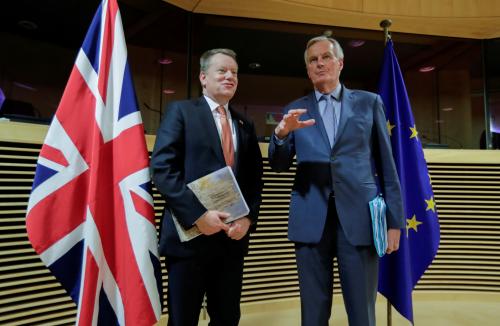After several years of pandemic uncertainty, many undergraduate students in the United Kingdom (U.K.) are now making plans to study abroad for the 2022-23 academic year. Unlike in previous years, students no longer have access to the rich opportunities provided by the European Union’s (EU) pan-continental exchange program, Erasmus+. Reversing an earlier promise from Boris Johnson, the U.K.-EU trade agreement finalized in late 2020—the result of the U.K.’s departure from the EU, i.e., “Brexit”—did not include a provision for the U.K. to remain in the popular program. Instead, students that wish to receive funding for international experiences have had to make use of the Turing Scheme, a U.K. government funding program that was launched in 2021 as a substitute for Erasmus+.
Erasmus+ was once a fruitful opportunity for intercultural exchange, professional development, and intellectual enrichment for the U.K., and its loss has already had negative consequences for British students and scholars. But it isn’t too late. There is still a potential path for the U.K. to rejoin the program and regain access to all its benefits. If it chooses not to, the country’s once-rich academic and scholar environment is likely to continue to deteriorate.
What is Erasmus+?
Launched in 1987, the Erasmus+ program usually does not garner much attention outside of the EU, but it has become a pillar of European integration and cross-cultural understanding. The program primarily funds exchange for individual students, higher education staff, young professionals, and volunteers among participating nations. It is best known for funding study abroad semesters for university students, but it also funds or facilitates volunteer opportunities, internships, teaching exchanges, and other types of experiences.
In addition to facilitating exchange for individuals, Erasmus+ also offers opportunities to a variety of organizations such as universities, think tanks, companies, and research organizations to establish linkages to peer institutions across Europe. Through Erasmus+, organizations can establish sustained collaborations to improve professional development and best practices for staff and encourage international mobility in staff and students. The program also offers opportunities for teaching, research, and policy debate on the EU specifically.
What has the U.K. lost by leaving Erasmus+?
Withdrawing from Erasmus+ has already had negative consequences for students, young professionals, scholars, and universities in the U.K.. The cultural and intellectual consequences of the decision are obvious. Thousands of students can no longer experience other cultures, learn to communicate in other languages, or strengthen their sense of European identity through Erasmus+. Many Erasmus+ alumni regard the experience as one of the most formative in their lives, having led to career changes, relocation, and even marriages. These opportunities are no longer available to many in the U.K., particularly those that already come from disadvantaged backgrounds. The loss of the program also severs key partnerships between European and British researchers and universities, limiting intellectual collaboration across the channel. The consequences of the decision for career growth also are significant. According to the latest Erasmus+ annual report, the program has been successful along multiple dimensions:
- In 2019 alone, almost 1 million young people participated in the program as students, trainees (largely for vocational training) or volunteered at more than 100,000 organizations.
- Employers regard Erasmus+ exchange participants as better equipped to enter the workforce.
- Over two-thirds of students report having a better sense of their long-term career goals after having participated in study abroad through Erasmus+.
Independent empirical research supports the claims of the program’s reports. Surveys of recent Erasmus+ participants have found that students feel the program has a large positive impact on foreign language development and personal career growth. The program also shapes students’ ideas regarding citizenship and European identity. Going beyond student perceptions, one study even found that students who had studied abroad through Erasmus+ earned salaries that were 10 to 12 percent higher than peers who had not participated in the program, even after controlling for preexisting socioeconomic differences between the two groups.
These lost opportunities will severely hamper the professional development of British students. These students have lost out on key opportunities to develop foreign language skills, form networks, and strengthen intercultural collaboration—opportunities their European peers continue to access. This puts them at a disadvantage in the job market and impacts their long-term career progress.
Leaving Erasmus+ also results in the U.K. forgoing millions in revenue from European students studying at U.K. universities. The popularity of U.K. universities for Erasmus+ students means that the U.K. typically received far more students than it sent. In 2019, the U.K. sent 18,305 students and trainees abroad through Erasmus+ and received 30,501 students and trainees. Incoming students bring revenue into the U.K. that strengthens the local economies of the university towns they visit. One study estimates that incoming Erasmus+ students generated 420 million pounds in revenues for the U.K. each year prior to leaving the EU.
Beyond its impact on student learning and development, leaving Erasmus+ has also curtailed opportunities for faculty and researchers. Through its Jean Monnet Actions, Erasmus+ supports research and teaching on the European Union and on Europe more broadly. The program’s grants have been awarded to more than 1,000 universities in close to 100 countries since its inception in 1989. While recipients are not required to be located in an EU member state, most of Erasmus+’ teaching and research grants are reserved for organizations located within the EU. By withdrawing from Erasmus+, the U.K. has denied faculty members the opportunity to teach students of diverse, multicultural backgrounds and to learn from the pedagogical best practices of others across the continent. It also has foregone opportunities for the U.K. to become a key participant in research on multi-level governance, European culture, Europe’s place in the 21st century global economy, and other key policy issues.
What about the Turing Scheme?
The British government has created several programs intended to fill the gaps left by the U.K.’s departure from Erasmus+. Its primary designated replacement is the Turing Scheme, which began funding study abroad opportunities for students studying in the U.K. in fall 2021. But this program only partially filled the hole left by Erasmus+.
Under the Erasmus+ scheme, tuition and fees for exchange students were waived thanks to reciprocity between participating schools. Member states paid into Erasmus+ in order to support both incoming and outgoing students. However, the Turing Scheme only supports outgoing students and does not provide any funding for students from other countries who wish to study in the U.K.. Moreover, it does not provide funding for tuition and fees, instead relying on the as-of-yet unfulfilled promise of reciprocity from partnering EU schools, which would waive tuition and fees for incoming U.K. students in exchange for similarly waived costs for outgoing students. This shortcoming particularly impacts students from disadvantaged backgrounds, whom the government argued were better supported by the Turing Scheme than by Erasmus+. As a result of these characteristics, the new system has drawn criticism from students, educational professionals, and policymakers, especially given the decision to transfer administration of the program to a new company for the 2022-23 academic year.
The Turing Scheme also fails to provide opportunities for universities and researchers, a key component of Erasmus+. In a separate effort, the U.K. government attempted to entice leading academics to move to the country through a fast-track visa program for winners of global awards such as Nobel prizes. However, the program had failed to attract a single applicant by December 2021, six months after it launched. Other components of Erasmus+ that are aimed at researchers, such as research funding and cross-institutional linkages, are missing entirely from the Turing scheme.
How can the U.K. fix this?
The U.K. should immediately take action to rejoin Erasmus+; many have already advocated for constituent countries within the U.K. to do so. Thanks to funding from the Irish government, students at universities in Northern Ireland are still eligible to participate in Erasmus+. However, efforts for Scotland and Wales to rejoin the exchange scheme have been less successful. In early 2021, over 100 members of European Parliament signed a letter asking the European Commission to consider options that would allow Scotland and Wales to rejoin the exchange scheme. Less than a month later, European Commission President Ursula von der Leyen rejected these appeals, asserting that only sovereign countries were eligible to participate in Erasmus+.
Although it may not be possible for separate nations within the U.K. to rejoin Erasmus+, there is still potential for the U.K. as a whole to rejoin as a non-EU participating party. Many observers had hoped that in the wake of Brexit, the U.K. would continue to participate in the program. North Macedonia, Iceland, Turkey, Norway, Serbia, and Liechtenstein all participate in Erasmus+ as non-EU program countries in exchange for a negotiated fee. The U.K. and EU had negotiated on this topic prior to Brexit but were unable to come to an agreement. The EU has signaled that it would be open to reopening negotiations on this topic.
Previous negotiations for the U.K. to remain in Erasmus+ reportedly fell apart over the cost to the U.K. While figures from the negotiation were not made public, a senior negotiating official reported that the EU was demanding the U.K. pay hundreds of millions of pounds per year. While a large sum, this does not seem to represent a significant increase from the U.K.’s contributions prior to Brexit. During the 2014-2020 Erasmus+ cycle, the U.K. contributed 1.8 billion euros (equivalent to about 1.5 billion pounds currently) in total.
Furthermore, existing evidence suggests that the economic gains from rejoining Erasmus+ more than outweigh the program’s costs through the money spent by Erasmus+ students in the U.K., not even accounting for the productivity gains from professional development opportunities in the program.
It is clear that it is in the economic, cultural, and intellectual interests of the U.K. to start the process of rejoining the Erasmus+ scheme. While the country will be excluded from the first few years of the 2021-2027 cycle, prompt negotiations could make it possible for the U.K. to rejoin Erasmus+ by the 2023-24 academic year. To start this process, the U.K. can immediately begin negotiations for a new Association Agreement to attach to the U.K.-EU Trade Treaty that would enable the country to rejoin Erasmus+.
Conclusion
In letting go of its participation in Erasmus+, the U.K. has significantly damaged its once-strong academic reputation, limiting opportunities for professional development and cultural engagement for its scholars, students, and young professionals. Instead of relying on the comparatively less impactful Turing Scheme, the U.K. should work with the EU to rejoin Erasmus+ and restore the program’s plentiful opportunities to its academic environment.
The Brookings Institution is financed through the support of a diverse array of foundations, corporations, governments, individuals, as well as an endowment. A list of donors can be found in our annual reports published online here. The findings, interpretations, and conclusions in this report are solely those of its author(s) and are not influenced by any donation.
The Brookings Institution is committed to quality, independence, and impact.
We are supported by a diverse array of funders. In line with our values and policies, each Brookings publication represents the sole views of its author(s).







Commentary
Op-edWhy post-Brexit UK should rejoin the EU’s Erasmus+ exchange program
June 1, 2022